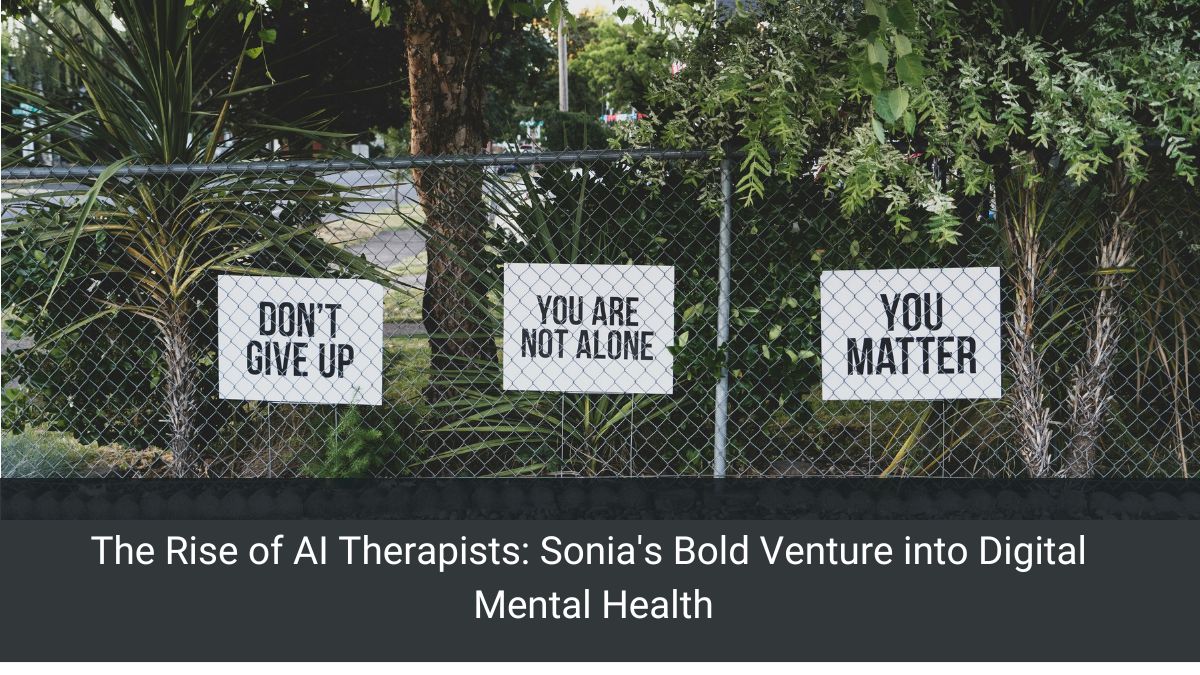Uncategorized
The Rise of AI Therapists: Sonia’s Bold Venture into Digital Mental Health

In an era where technology permeates every aspect of our lives, it was perhaps inevitable that artificial intelligence would make its way into the realm of mental health. Enter Sonia, a startup that’s pushing the boundaries of what’s possible in therapy by offering an AI-powered alternative to traditional counseling. But as with any disruptive technology in healthcare, Sonia’s approach raises both excitement and concern.
The Promise of AI Therapy
A Solution to the Mental Health Crisis?
The mental health landscape in the United States is in dire straits. With more than half the country lacking adequate access to care and a staggering 42% of adults unable to afford treatment, innovative solutions are desperately needed. Sonia’s founders—Dustin Klebe, Lukas Wolf, and Chris Aeberli—believe their AI therapist could be the answer.
Their app, priced at $20 per month or $200 annually, aims to bridge the gap between supply and demand in mental health services. It’s a noble goal, considering the current state of affairs. As someone who’s witnessed friends struggle to find affordable therapy, I can’t help but be intrigued by the potential of such a solution.
The Technology Behind Sonia
Sonia leverages multiple generative AI models to analyze user input and respond appropriately. The app incorporates cognitive behavioral therapy techniques, assigning “homework” and providing visualizations to help users identify stressors. It’s an impressive feat of engineering, especially considering none of the founders have formal backgrounds in psychology.
The Controversy Surrounding AI Therapy
Can Machines Replace Human Connection?
While some studies suggest that chatbots can be effective in reducing symptoms of depression and anxiety, the jury is still out on their overall efficacy. The human connection between therapist and client has long been considered a crucial factor in successful treatment. Can an AI, no matter how sophisticated, truly replicate this bond?
I recall my own experiences with therapy and how the empathy and understanding of my counselor were pivotal in my healing process. It’s hard to imagine an AI replicating that level of human warmth and intuition.
Ethical and Privacy Concerns
Sonia’s approach to user data is commendable in its minimalism, storing only a user’s age and name. However, questions remain about the storage and use of conversation data. In an age where data breaches are all too common, the sensitivity of mental health information demands the utmost care and transparency.
The Limitations of AI Therapy
Cultural and Linguistic Barriers
One significant drawback of current AI technology is its inherent bias towards Western perspectives. This limitation could lead to misinterpretations or missed cues when dealing with users from diverse cultural backgrounds. As someone who’s lived in multiple countries, I’ve seen firsthand how mental health expressions can vary dramatically across cultures.
The Risk of Misdiagnosis
AI chatbots, despite their sophistication, may struggle to pick up on subtle signs that a human therapist would notice. The case of the National Eating Disorders Association’s chatbot Tessa, which inadvertently dispensed triggering weight-loss advice, serves as a cautionary tale.
The Future of Mental Health Care
A Complementary Tool, Not a Replacement
Klebe emphasizes that Sonia isn’t trying to replace human therapists. Instead, it aims to serve those who can’t or won’t access traditional therapy. This perspective aligns with the growing trend of digital health solutions complementing, rather than replacing, traditional healthcare.
The Need for Ongoing Research and Development
As Sonia and similar platforms evolve, it’s crucial that they continue to engage with mental health professionals and conduct rigorous studies. The recent hiring of a cognitive psychology graduate and the search for a full-time clinical psychologist are steps in the right direction.
A Cautious Optimism
The emergence of AI therapists like Sonia represents a fascinating intersection of technology and mental health care. While the potential benefits are enormous—increased access, lower costs, and 24/7 availability—we must approach this new frontier with caution and critical thinking.
As we move forward, it’s essential that we continue to ask tough questions about the efficacy, ethics, and limitations of AI in mental health care. At the same time, we should remain open to the possibilities these technologies offer for improving mental health outcomes on a global scale.
The journey of AI in therapy is just beginning, and it’s up to all of us—developers, mental health professionals, and users alike—to shape its path responsibly. As we navigate this brave new world of digital mental health, let’s strive for a future where technology enhances, rather than replaces, the human touch in healing.
